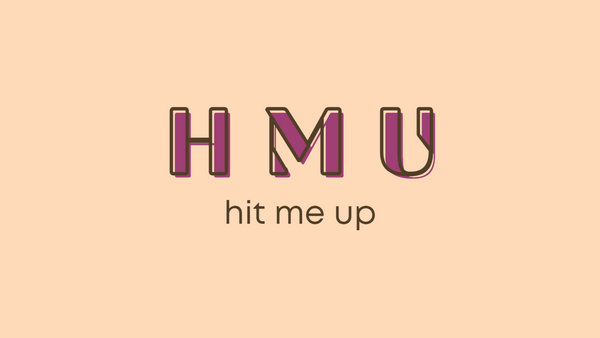Short forms have been part of our dialect for almost as long as we’ve known and used language. Each language has its own style and format when it comes to short forms. The English language has had various phases of short forms. What first began as an easier way to merge two words slowly moved on to shortening the same word.
Short forms are useful aspects of language as they render quick communication. You can say more with less. These days, the main generator of short forms that often make it to the dictionary, is social media and the internet. From abbreviations to acronyms, initialisms, and short-forms, the internet is one of the biggest linguistic influences of our time.
However, this particular slang wasn’t invented by the internet. In fact, the internet and social media helped popularize it in recent years. Nevertheless, the internet’s style of saying it is different from the slang’s original monicker. Here’s to the slang that’s been around for two centuries, but became more known, all thanks to ‘Among Us’.
So, What is ‘Sus’?
‘Sus’ is short for ‘suspect’ or ‘suspicion’. Although ‘sus’ is more visible now after becoming a popular phenomenon and a widely-used meme during and post the 2020 internet game plus trend; Among Us, it has been an internet slang for much longer.
The first ‘sus’ entry in the Urban Dictionary was in 2003 by a username, ‘Diego’. So, it could be safe to say that this is possibly the first time the slang was used on the internet and pushed into the digital network. Eventually, ‘sus’ became part of colloquial language on and off the internet.
When ‘sus’ regained popularity in 2020, every utterance of the word had ‘Among Us’ implications among people familiar and borderline obsessed with the game. It implied having a ‘suspicion’ on someone, regarding them as a ‘suspect’, or finding something ‘suspicious’ about someone or something.
If Among Us introduced you to ‘sus’, then, the slang would have the roots of the game in your dialect. But, if your acquaintance with ‘sus’ has been steady for the past two and a half decades, then, your definition would match the term’s earliest internet presence irrespective of the game. However, if you’ve been using British slang for over 30 years, then, ‘sus’ to you, has a whole other meaning.
Older origins of ‘sus’
Before ‘sus’ entered the digital realm, it was a colloquial aspect of British English. The British vocabulary, then (and to this day), has two variants of the same word carrying the same meaning – ‘suss’ and ‘sus’.
The British slang began using ‘sus’ as ‘suss out’ and its relevant tenses. Essentially, ‘suss out’ means to figure something or someone out. It’s also representative of gathering or learning new info about someone or something.
Going way back to the possible origins of ‘suss out’ in British English — the slang has policing roots. British police in the early 1900s used ‘suss out’ while inferring to unearthed information about a crime/case.
In most conversations, ‘suss out’ hints at surfacing classified info or secrets about an investigation. Sometimes, ‘suss’ referred to a suspect, but it was mostly encryption for details and info that were highly confidential. ‘Suss’ was more a code word than slang.
Oldest origins of ‘sus’
‘Sus’ or ‘suss’ has always been part of police vocabulary given its nature, meaning, and representation as a short form. Today, ‘sus’ is used casually and in non-police contexts, but ‘suss’ seems to have made its debut in colloquial speech nearly two centuries ago.
The UK Parliament passed the Vagrancy Act in 1824 that made sleeping on the streets, in public, and acts of begging, an offense under the fourth section of the Act. Simultaneously, the ‘Sus Law’ was passed.
This law gave police forces the permission to stop, search, investigate and possibly arrest people who seemed suspicious or ‘sus’ — hence the name of the very law. In other words, the ‘Sus Law’ permitted unwarranted searching of people who seemed like they were offending the Vagrancy Act.
To put things into perspective, ‘sus’ was originally and largely used to prosecute individuals under no evidential grounds, except for the fact that these so-called suspects frequented public spaces to sleep and/or ask for money. The present-day usage of ‘sus’ is definitely a benign turn of events, although in some parts of the UK individuals are still charged for simply seeming sus/suss.
Sus: The ‘Among Us’ Rage
For those of you who don’t necessarily live under a rock, and don’t have a practical interest in viral internet trends, here’s how the internet game ‘Among Us’ revived the ‘sus’ slang in 2020. Knowledge for knowledge’s sake.
As you can tell by now, ‘sus’ is not a new colloquial term in the English dialect. It’s always been there, fluctuating like every other slang, except, for the past 200 years or so. The reason why the online game, ‘Among Us’ brought ‘sus’ back in vogue lies in its game description.
The main agenda of this astronautical game is to survive as a crewmate by completing tasks, and all the while trying to call out the imposter who, in the meantime can and will eliminate crewmates. The crux of survival in this game is to call out the ‘sus’.
Now, if you’re a crewmate, survival depends on how fast you can point out to the imposter before they kill you. The imposter is the suspect, who may appear suspicious to crewmates — thus attracting possible suspicion and being eliminated before killing the rest of the crew. Thus, ‘Among Us’ had us saying ‘sus’, again, in a much safer manner.
How to Use ‘Sus’ the Current Way?
‘Sus’ still carries the same implication as it did 200 years ago. But, thankfully, in a harmless fashion. The term’s usage doesn’t limit only to suspicion, but it also communicates doubt, disbelief, deceit, dishonesty, disloyalty, questionability, and untrustworthiness at large. Besides, ‘sus’ can also be a replacement for ‘fishiness’.
Here are some use-cases for ‘sus’ in the present, social media context:
When something doesn’t seem right
Suspicion always banks in the wrong direction. Something’s off about a situation or a person. If you’re conveying this seriously or humorously, you can use ‘sus’. There’s no hard and fast necessity for your usage to be backed by facts — it’s internet slang, after all. Most times, it’s used for the fun of it!
For example – ‘Dude. I don’t trust her one bit. She’s been so sus since the day we started talking’ or ‘What’s the matter yo? Something’s sus about you today?’.
If something’s questionable, it’s sus-worthy
Transparency is hardly questioned because nothing’s questionable about it. When things become a little less apparent and more questionable, that’s when they raise doubts, questions, and eyebrows, too. This scenario is another perfect ‘sus’ context.
For instance, ‘I have no idea what he’s up to these days. His irregularity at work is SO sus‘ or ‘You may have all the power to do as you like. But, the moment you start exploiting that power, it wouldn’t take them very long you sus you out’. (The latter mixes a bit of the old-school usage of sus — which is another workable use-case for the slang).
Don’t believe it? It’s probably sus
Another branch of ‘sus’ definitions is disbelief. If you don’t buy a word of something or of what someone’s saying, you could reply with a ‘sus’. Like:
- Yooooo. Guess what?
What?
We’re having concerts from next month!!!
What?!! I don’t believe it. I thought we were in the COVID scene.
Yeah.. But I heard there’s allowance for concerts!!
Oh, dude. I really think that’s sus. Won’t happen.
Gee. Thanks for ruining the vibe. - Apparently, we’re not having family lunches anymore.
WHY?? What did you do?
What?! Lol! Nothing, man. Mum told me.
Oh.. SUS.
When something or someone’s shady
Do you sometimes simply doubt the legitimacy of something or someone? Do you trust your gut and unflinchingly convey what it’s saying? Then, that’s a gut feeling of sus, right there. Use the slang each time you feel something or someone to be shady.
For instance, ‘Great pay, pretty site, nice working space and reasonable hours. But something’s still so sus about them. They don’t have an HR!!!’ or ‘Yeah, I saw him too. He repeatedly stressed that the money was for his kid, but I doubt it, man. Seemed super sus.
These are just some of the use-cases for ‘sus’ but they’re the main ones, nonetheless. The slang can be spoken or texted out. It’s one of those internet slangs that doesn’t seem out of place when used in spoken language. Anything synonymous with suspicion/suspicious/suspect can have the slang ‘sus’ in its context.
Emojis That Go Great With ‘Sus’
While texting, we use emojis to better the conversation, improve visual consumption, decorate our content, or simply because we can and that emojis are freely available. While using ‘sus’, there’s no specific emoji for the slang, but there is a handful that can replace, go with, or complement ‘sus’.
The Disguise
Nothing screams ‘sus’ as much as a person in disguise, and the 🥸 Disguised Face emoji signifies exactly that. If you feel something or someone is not as they seem and are texting or typing out a caption about it, you can accompany ‘sus’ with 🥸.
Like, ‘The next way to steer clear of sus is to read between the lines 🥸’ or ‘Hmm. Nice gal, but seems a little sus to me 🥸 Why the credit card, though? That’s the sus, my friend. That’s what’s sus.’.
The Detective
If you or someone else is trying to catch a sus red-handed, you can use the 🕵️Detective emoji to set the record straight. This emoji, unlike the ‘Disguised Face’, doesn’t speak for the sus, but rather for the one who calls out the sus.
For instance, ‘She had an intense sus on this arrangement and turned out to be right. How about that?🕵️’ or ‘Ohhh bruhh. This is major sus vibes, yo. Funny you couldn’t figure it out. Usually, I’m the weak one 🕵️’.
Raised Brow
Raised eyebrows sum up the ‘sus’ emotion. It’s a physiological response to disbelief and sus. In real life, many of us raise our eyebrows when we witness something sus, and you can do the same textually as well. For example, ‘So… Lemme get this right. You expect me to outright believe this hoax?🤨’ or ‘This message seems straight-up sus to me, yo 🤨’.
Rats
We’re positive that rats did nothing to build a sus image for themselves, but, the figure of speech goes by the smell. When a rat’s around (especially a dead one), you can sniff it out in seconds — and if you’re good at reading sus, then you’re quicker to smell a rat.
If something or someone seems fishy, more like ratty, feel free to call out the sus-sy rat on text with the🐀 Rat emoji. To emphasize the sniffing more than the animal, you could substitute the rat with a 🐽 Pig’s Nose emoji. Here are some examples:
- I can’t seem to place what’s up with this poster, but seems pretty sus to me 🐀
- Man, you kidding me right now? I can smell the sus in this person from here and I live in another country! 🐽
- If there’s no transparency in the third date (at least), I’d say I smell sus as hell 🐀. You don’t even know where the guy lives, for crying out loud!!
- What did I tell ya? I’m pretty good at sniffing out sus, aren’t I? 🐽
Conclusion
‘Sus’ may seem like a modern-day shortcut to communicating the word(s) in its entirety — but it’s been around for much longer. The slang had a pretty unfair and unfortunate origin, but today, it’s used inoffensively and in light-hearted contexts.
After being active in the sphere of crime, accusations, arrests, and legal actions, ‘sus’ is a colloquial term for disbelief, today. ‘Sus’, in today’s usage is short for any form of the word ‘suspect’ (suspicion, suspicious, suspects, etc.).
You can either figure out the way ‘sus’ is used based on the context or simply understand and imply ‘sus’ as ‘suspicious’ (and related synonyms) in any framework.










Member discussion